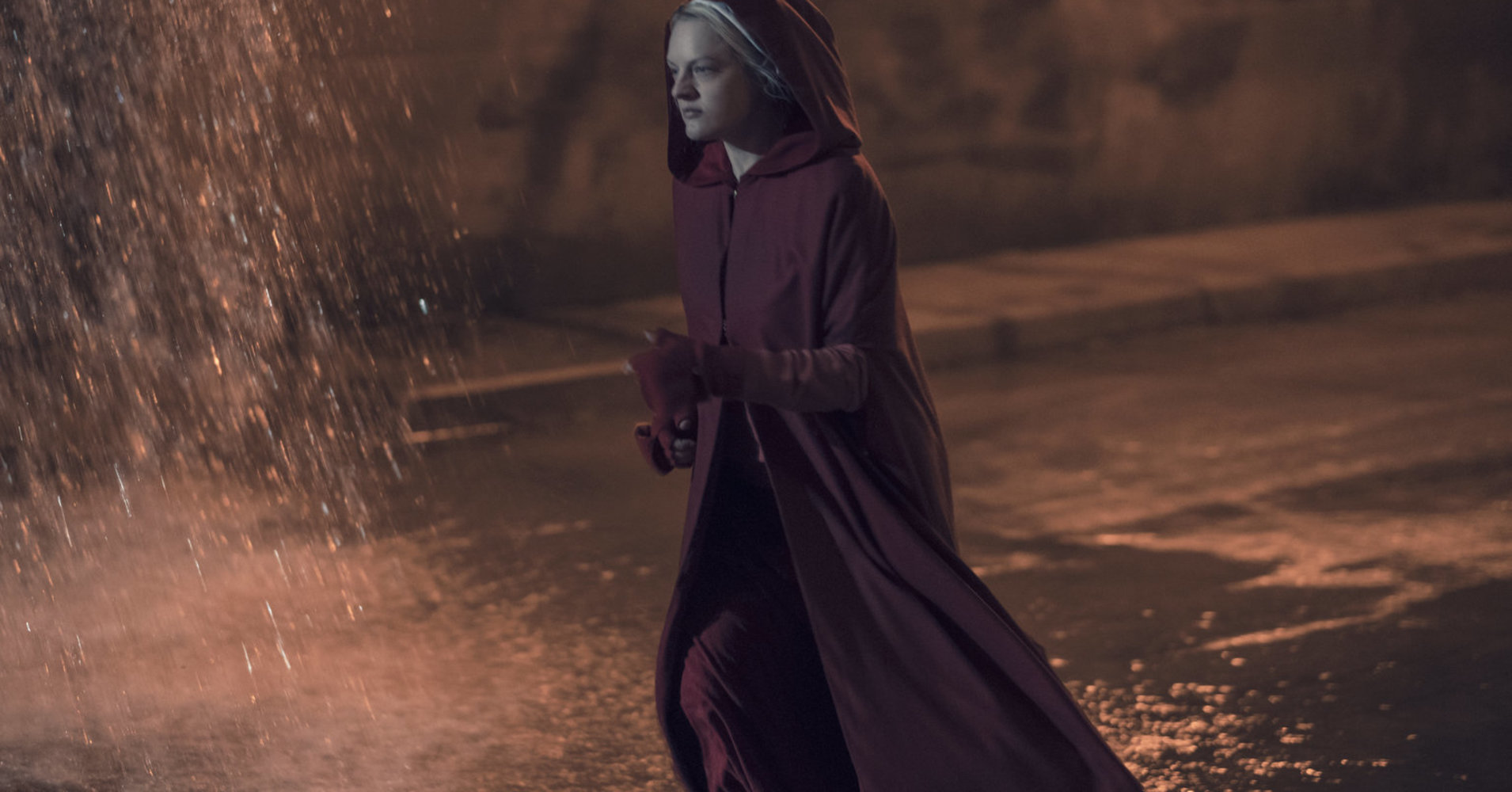
Warning: Spoilers for “The Handmaid’s Tale” Season 2 finale below!
Well, at least someone got out of Gilead.
After Emily stabs Aunt Lydia, Commander Lawrence reveals himself to be a better man than most in Gilead. He drives Emily to a meeting point where she and June have the ability to escape once and for all. (Also, listening to “Walking on Broken Glass” will never be the same.)
Of course, June was never going to leave Gilead just yet. We’re only at the end of Season 2, people! But this time, the not leaving was a choice she made, knowing that her baby daughter and her BFF would be leaving together. And now that June has irrevocably parted ways with the Waterfords, she’s on a mission: Get Hannah and get the fuck out.
On the other end of the winning-at-life-in-Gilead spectrum is Serena Joy. After two seasons of seeing her alternately composed, pointedly cruel and righteously angry, Commander Fred Waterford has finally succeeded at breaking his wife’s considerable spirit. She tried to organize the other wives to push for girls and women to be able to read in Gilead. Instead, she loses a finger in a draconian move co-signed by her husband. And then she loses the daughter she wanted so desperately to be hers.
It would be impossible to properly close out the finale without a shout-out to the unsung heroes of Gilead: the Marthas. These women often feel invisible, standing in the margins of both the show and Gileadean society. Yet they hear everything, do much of the care-taking for Gilead’s children and have a freaking Underground Martha Railroad.
Rita forever and ever and ever.
We’re gonna bask in the glow of this action-packed finale before we have to start stressing out about what might happen in Season 3.
Emma: It’s been a long, arduous, exhausting, stressful journey, but given that we now basically live in Gilead, I was relieved that Season 2 of “The Handmaid’s Tale” ended with a bit of triumph.
This week, Donald Trump put forth Brett Kavanaugh as his SCOTUS nominee. As a result, we very well might see a United States in which access to reproductive rights and health care are curtailed greatly in the very near future, and I truly needed a reminder to “nolite te bastardes carborundorum.”
This finale was full of righteously angry women taking action (for better or worse) in various capacities: June, Emily, Rita and even Serena Joy. They may not have all been successful or particularly wise in their endeavors, but at least they fucking did something.
Hulu
Laura: Yes ― I just wrote a piece today on how five men could ultimately reverse abortion rights in the United States, and then the final “Handmaid’s Tale” episode ― always eerily prescient ― presents a panel of men deciding whether women and girls in Gilead should be allowed to read. Using Eden’s Bible, which is scribbled with her meticulous notes, Serena and the other wives make a strong case for why their daughters should have a right to education ― to “read God’s word.” And the Commander dismisses her. “We appreciate your interest in our work,” he says ― reminding the women that the business of governing is solely men’s domain.
Then he has Serena arrested, and she returns home missing a finger.
I think it’s interesting that the Commander punishes Serena so harshly for her insubordination ― whipping her, having her hand mutilated ― while June literally slaps him across the face, and all he has for her are a few harsh words. “You are the misery of all men,” he says. “All of you.”
I get the sense that the Commander only doles out punishments when his power is challenged publicly. He doesn’t necessarily need absolute power, personally ― he seems to respect June’s insubordination and even invites her to stay in his house after she hits him back ― but he needs to maintain the appearance of absolute power in Gilead.
Did you notice the different ways he treats the two women?
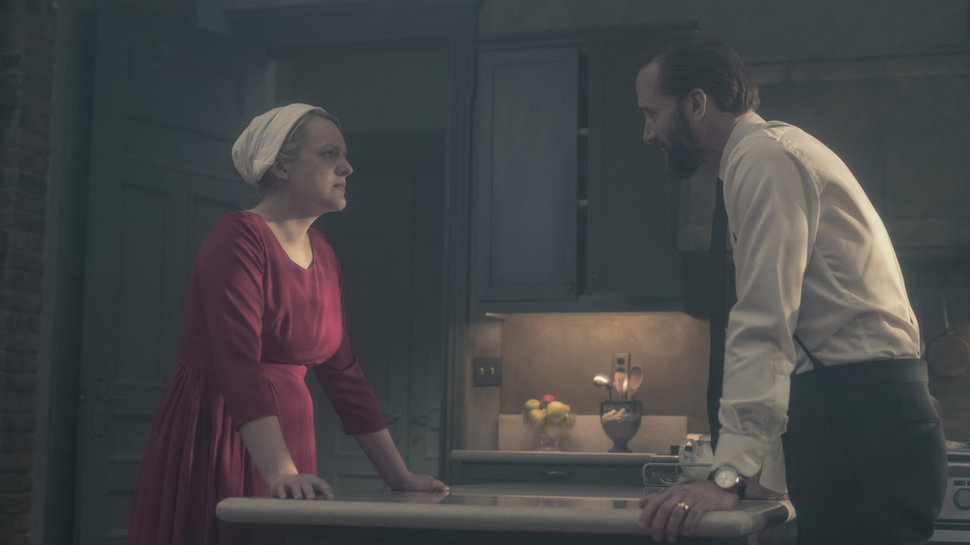
Hulu
Emma: Yes! It’s a striking contrast. It feels a little bit like the madonna-whore complex. Serena is his wife, the madonna. She is above June in purity, but also must stay in her lane. June is, in essence, a concubine, a whore ― albeit one who has a strong spirit and whom Fred enjoys meeting as equals when it pleases him (aka in private), toying with and ultimately holding under his thumb.
I suspect Fred spent much of his pre-Gilead life in his wife’s shadow. She was the smarter one, the more eloquent one, the more famous one. Now she has helped him create a world where he is always above her without having to prove anything except his macho authority. When she organized the other wives in an act of resistance to the Gilead status-quo, Fred ― and the other men, 90 percent of whom were white, an eerie echo of so many of the Trump administration’s meetings and photo ops ― looked genuinely startled, threatened even. Their power is only held up if their wives buy into the idea that their husbands have the final word. Their power is, in essence, a total farce, held together only by complicit women.
That’s why Fred felt he needed to use force to quell Serena’s questioning. It reminded me of a quote from Rebecca Traister’s piece on female rage: “One reason that the fury of women is regularly dismissed as theatrical and marginal and unserious is precisely because, on some level, the powerful must sense that it is the opposite of all of those things. That, in fact, it presents a very real threat … The reason the anger of a majority gets suppressed is because it has the power to imperil the rule of the minority.”
Fred and the other commanders know that the anger of their wives, if not shut down, represents that very real threat.
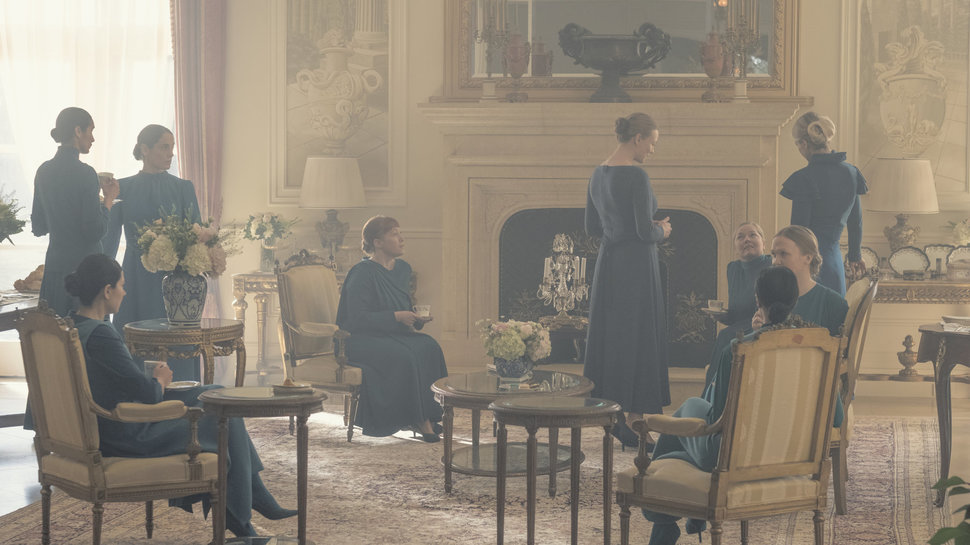
Hulu
Serena has spent much of this season being disabused of the idea that white, male, patriarchal power will save her. This was her final grasp. She believed that if she followed their rules ― remained a member in good standing, simply brought forward a proposal ― she would be listened to. But, of course, the opposite happens. Her opinions bring her nothing but loss. And that act of taking her finger, turning her over to the Guardians (as we find out Eden’s father did to her) cements the truth: Tying yourself to oppressive, powerful men will not save you. And it certainly will not save your daughter.
But putting Serena aside for a minute … we need to talk about Emily. We both gasped during multiple points in her storyline this episode, so I know we both have *FEELINGS* about it.
Laura: First of all, since I always feel the need to comment on the musical choices in this show, I just want to say that this episode RUINED my break-up anthem, “Walking on Broken Glass.” The contrast between the empowering, uplifting songs and the creepy, horrifying scenes they accompany is just so jarring and effective. Season 2 really plays with music in a way that Season 1 did not, and I am here for it.
On to Emily. She thinks she is about to go into a rape ceremony with the nutty professor, so she grabs a dirty knife. Is she going to stab herself? Him? We don’t know.
Turns out he doesn’t intend to rape her at all, and she is so confused by the whole thing that she ends up stabbing Aunt Lydia. I guess she had to stab someone. But this is the scene that made me gasp at my desk. Did not see that coming.
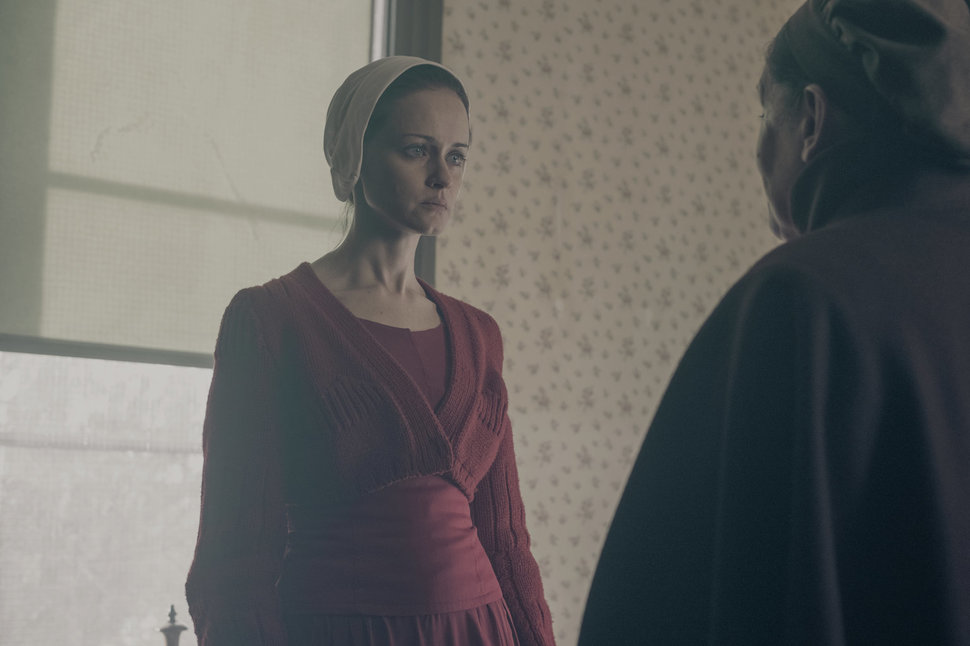
Hulu
Of course, it was poetic justice for a handmaid to beat the shit out of Aunt Lydia, who has been oppressing them, torturing them and facilitating their rapes. But Emily seems immediately conflicted and remorseful about what she just did, and also terrified about what it means for her future. The scene may be cathartic for us, but it doesn’t appear to have been cathartic for Emily.
But while Emily cries and panics and tries to process what just happened, the professor barely reacts, and we soon learn that his intention is to free her from Gilead. Why her? Is it because she was a professor in her previous life, and he respects her intellectually? Is it because she is gay and has been genitally mutilated, so he feels extra pity for her and wants to protect her from any future rape ceremonies?
What’s clear is that even though her savior is a man ― the architect of Gilead’s economy, ironically ― Emily asserts her power up until the very end. She was going to fight either way. And in ridding (or trying to rid) Gilead of Lydia, she did her part to protect the other women before escaping.
Emma: I have a sneaking suspicion that Lydia will live to see another day. They can’t kill off Ann Dowd with so little ceremony, and we did see Commander Lawrence’s Martha call an ambulance. I also suspect that Commander Lawrence will make an appearance in Season 3. The finale seemed to suggest that he has been long harboring doubt and guilt about what he helped build in Gilead, and I’d love to see that explored more down the road.
I also agree with you that Emily’s rage-induced violence towards Aunt Lydia was justified, but not satisfying for her. It was a great illustration of the fact that violent resistance, while perhaps necessary in certain cases, also comes with a cost ― not just to the person on the receiving end of such violence, but the person who perpetrates it. I would imagine that Emily never saw herself as a killer, but Gilead has turned her into one.
While Serena deploys an act of resistance within the system and Emily deploys an act of violent resistance fully outside of it, we see a third, quieter option emerge from the Marthas. I was struck by Rita’s role in the wrap-up of this season and the window it gave us into the lives of the Marthas. These women have the least-noticed role in Gilead, but perhaps the most vital. They are often tasked with caring for the children. They are treated as window dressing, and yet that means they are privy to everything. It also allows them to organize without causing a stir. A handmaid away from her room might be noticed, but Fred moves right past it when Rita isn’t in the kitchen earlier in the episode.
And yet… turns out the Marthas have a freaking Underground Martha Railroad! Rita, who is, first and foremost, a survivor, decides to take a real risk. She creates a diversion and sends June on the Martha Underground (Backyard) Railroad, passed from one Martha to the next for safe-keeping, allowing June to set off on a path toward safety and potentially out of Gilead for good.
I also think it’s worth noting that many, if not most, of the Marthas we’ve seen in this season (including the badass lady doctor) have been women of color. That felt intentional to me ― women who are sidelined and ignored but prove to be the most vital to a resistance movement. Basically, the Marthas are the real MVPs of this season.
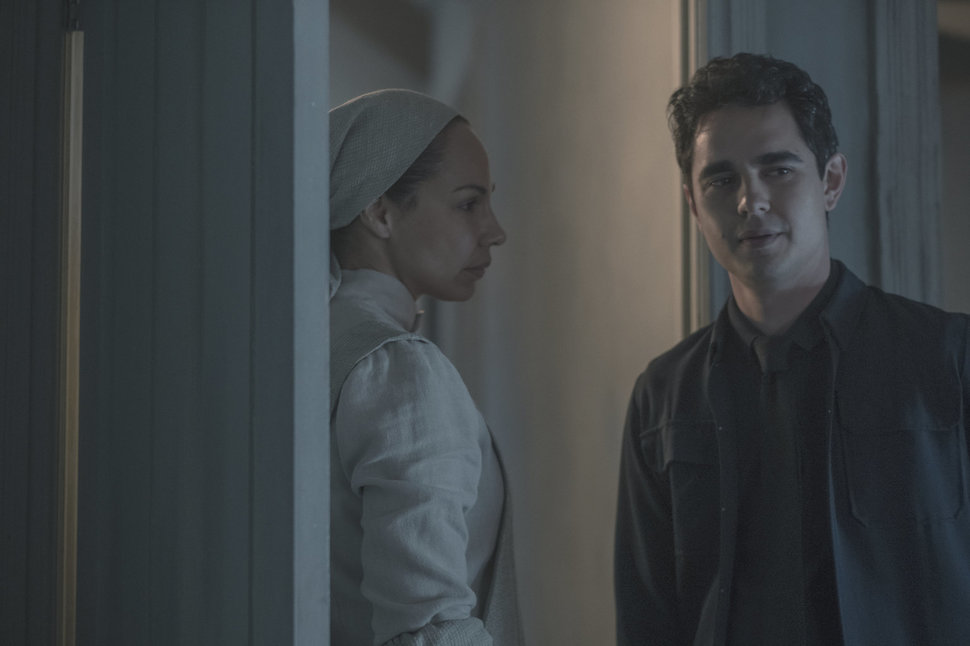
Hulu
Laura: Yes, I wish their characters had been developed a bit more! We are just starting to see some personality out of Rita. “I treated her like shit,” she says of Eden as she tries to come to terms with how she may have contributed to the teen girl’s death.
Then, later, to Nick: “Your girlfriend is a badass.”
Rita has emerged as an empowered and empowering woman, and I’m glad that she’s the one who ultimately facilitated June’s escape ― as opposed to some man who was feeling bad about having dreamed up this patriarchal hellscape.
But I also want to talk about June and Serena ― the relationship that has fascinated us the most the entire season. It was only weeks earlier in the timeline of the show that Serena convinced Fred to rape June at 9 months pregnant. And now, the two women have bonded over their shared love for baby Nicole/Holly, and their shared fear of their daughter growing up in a place where even the more privileged women are beaten, drowned, raped, mutilated, tortured and denied fulfilling work and education.
One of the most affecting scenes, for me, is when June asks Serena what happened, and Serena says, pitifully, “I tried.” June seems to understand that Serena has lost her finger fighting for their shared daughter, and she puts her hand on Serena’s hand to comfort her.
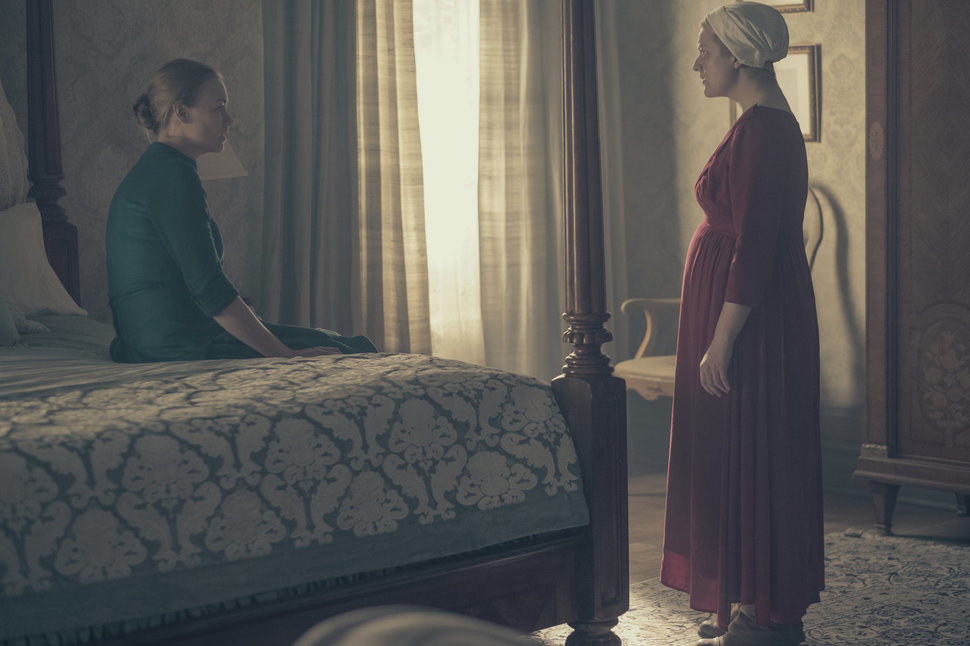
Hulu
Later in the episode, Serena finally becomes a human and hands the baby over to June to let her escape Gilead. Up until the last second, I was expecting her to change her mind and scream out for the authorities, betraying both June and Nicole. But in the end, it is all the women from different social statuses working together ― the Marthas, a handmaid and Serena ― who make the underground railroad happen and liberate baby girl from a life of misery. What a coup from the ladies of Gilead!
Emma: Yes! And for one blissful moment there, I believed that maybe, just maybe, June would get out. But, of course, there’s a Season 3 of this beautiful and godforsaken show.
The final Martha leaves June in the brush on the side of a road, wishing her “Godspeed.” You can see that June is feeling deep guilt about the idea of leaving Gilead for the sake of one daughter while her other daughter remains with new parents who we know are abusive. She pulls out a photo of Hannah and shows it to Nicole/Holly, telling her that she’ll meet her sister one day.
Finally, a car pulls up, and we suddenly realize that it’s Commander Lawrence’s car. Emily isn’t being murdered by a nutty professor! Instead, she’s joining June on her escape from Gilead. “What is happening?” asks Emily. “I’m getting myself in deep shit,” says Commander Lawrence.
And suddenly, June has her solution. An armored car pulls up and Emily gets in the back. You can see the wheels turning in June’s head as she hands over her daughter to Emily, instructing her to call her Nicole (a tribute to Serena, who is left pretty pitiable and alone?). Emily is screaming for June to join her, but June won’t leave Hannah to Gilead’s clutches. The final images of June felt like a superhero origin story to me. She pulls up her red hood and then lifts her face. It is contorted with fierce, resolute rage. She turns around, walks away and that’s it.
Laura: It was such a heavy, unexpected ending ― I just want to say that I appreciated the comedic relief of the professor shouting to Emily as he freed her: “KEEP AWAY FROM DRUGS!”
Lol. But seriously, she should take all the drugs. Whatever kind of self-care she needs at this point.
At first, I was upset and skeptical that June would not seize her chance to escape. But it makes sense, as you said, that she can’t leave Hannah in that place. I suppose we’ll see in Season 3 what Mayday is up to, and whether Serena and the professor remain good guys in the whole plot.
Until then, I will really miss us sobbing audibly at our desks across from each other once a week as we watch these screeners. And I’m sure our colleagues will miss it too.
Emma: Praise be. Blessed be the Fruit Loops. Godspeed.
To read more of HuffPost’s “Handmaid’s Tale” coverage, head here.

Be the first to comment